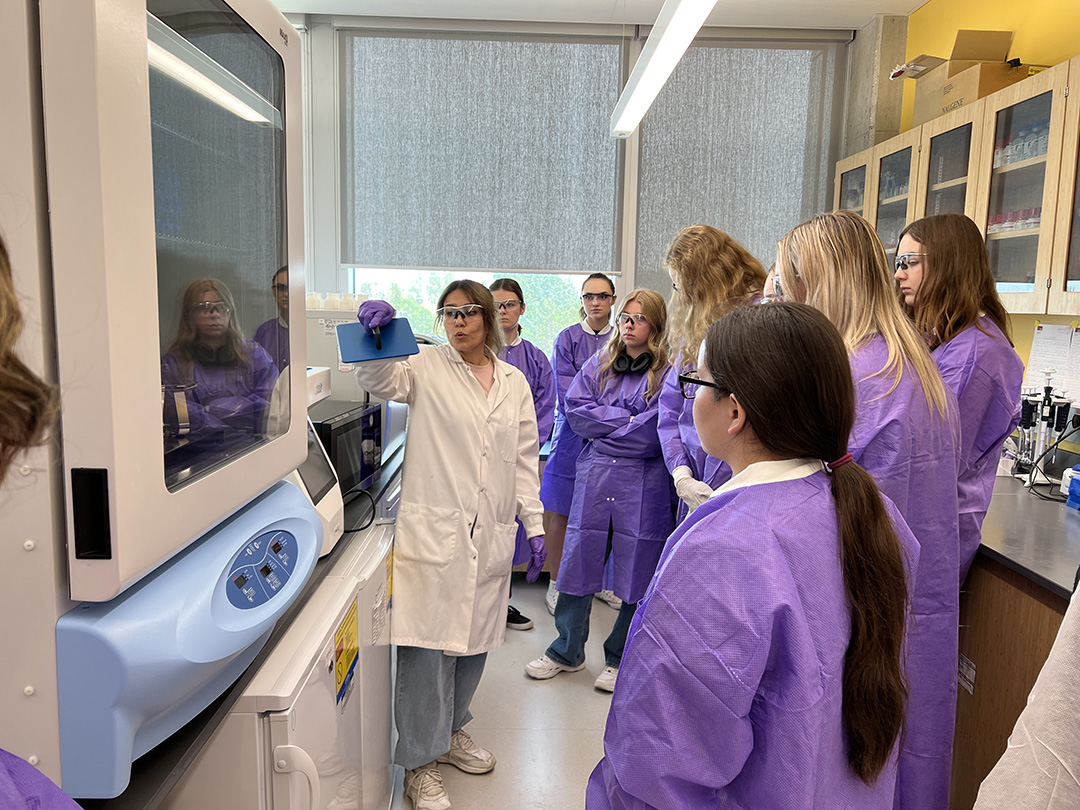 A monumental program centered on ovarian tissue cryopreservation is offering hope to women and girls across Canada. Dr. James Benson, a world-renowned cryobiology expert, leads this transformative initiative. This medical procedure safeguards healthy ovarian tissue before cancer treatments can harm it, ultimately enabling female patients to have biological children in the future. Dr. Benson's innovative approach involves extracting and preserving unaffected ovarian tissue, preventing its damage from the harsh effects of chemotherapy, radiation and surgery. Remarkably, Dr. Benson is one of the few pioneering research in reproductive cryobiology in Canada. He holds the position of associate professor in the Department of Biology at the University of Saskatchewan’s (USask) College of Arts and Science, playing a pivotal role in the concerted effort to establish an outstanding cryobiology research program at USask.
A monumental program centered on ovarian tissue cryopreservation is offering hope to women and girls across Canada. Dr. James Benson, a world-renowned cryobiology expert, leads this transformative initiative. This medical procedure safeguards healthy ovarian tissue before cancer treatments can harm it, ultimately enabling female patients to have biological children in the future. Dr. Benson's innovative approach involves extracting and preserving unaffected ovarian tissue, preventing its damage from the harsh effects of chemotherapy, radiation and surgery. Remarkably, Dr. Benson is one of the few pioneering research in reproductive cryobiology in Canada. He holds the position of associate professor in the Department of Biology at the University of Saskatchewan’s (USask) College of Arts and Science, playing a pivotal role in the concerted effort to establish an outstanding cryobiology research program at USask.
“I think it hits on a lot of different levels,” Benson says. “We’re really providing a service for women, but especially girls in need at a particularly vulnerable time. And the fact that we've got the infrastructure in place means that USask can be a beacon of hope.”
In the aftermath of cancer remission, the preserved ovarian tissue can be re-implanted, paving the way for the birth of a biological child. Benson emphasizes that this process has demonstrated significant success rates in helping children, adolescents and women of reproductive age achieve healthy pregnancies.
Ovarian tissue cryopreservation has transitioned from an experimental phase to mainstream practice in recent times. While Europe and the United States boast established clinical and research programs for this procedure, its availability in Canada remains limited.
“There is no option in Saskatchewan for some women and most girls with cancer that want to have fertility preservation,” Benson explains. “Some women can preserve their egg cells before treatment, but girls don't have any mature egg cells. The only option they have is to freeze this tissue. There have been a number of successes around the world. It's a great program that just needs to be offered [in more places].”
Dr. Laura Hopkins, MD, a professor in the Division of Oncology at USask’s College of Medicine and the provincial lead for gynecologic oncology, underscores the potential of this service to restore choice to women whose options have been curtailed by cancer. According to Hopkins, pediatric ovarian tissue is especially susceptible to the adverse effects of cancer treatments, and the sole recourse for girls under 13 is ovarian tissue cryopreservation technology.
“Being treated for cancer, whether it’s surgery, chemo or radiation, is isolating for everyone, and I think there's a real loss of confidence and hope for the future,” she elaborates. “These kids also face a loss of fertility and a loss of potential to have normal hormone production for sustaining health. Fortunately, most children nowadays are cured of their cancer. They are cancer survivors, and we need this program to give them their lives back.”
Hopkins also points out that instituting a cryopreservation program would align Saskatchewan with the care and fertility preservation guidelines of the Canadian Fertility and Andrology Society, an esteemed nonprofit organization dedicated to advancing reproductive sciences in Canada. Both Benson and Hopkins are optimistic about USask’s potential to pioneer such a program in Western Canada, thanks to the unique expertise of the faculty and the existing university facilities.
In 2021, Hopkins secured funding to advance research in ovarian cancer pharmaceuticals and diagnostics, along with establishing a tumor bank at USask for the safe storage and study of excised cancerous tissue. Additionally, Benson highlights the presence of numerous cryobiology-experienced researchers at USask, including those at the Western College of Veterinary Medicine (WCVM).
“By building this program, we could be modeling what the future state of a program in ovarian cryopreservation should look like,” Hopkins continues. “We happen to have James Benson here, and I feel like all of us should do everything to support unique talent within the institution.”
Krysta Hawryluk, a patient of Dr. Hopkins, serves as a living testament to the urgency of establishing a fertility preservation program. In early 2020, Hawryluk, initially believing she had endometriosis, received a devastating ovarian cancer diagnosis. Within weeks, she underwent surgery to remove her ovaries. When diagnosed in Saskatchewan, the option of cryopreservation was never on the table. Hawryluk, at the age of 28, had to undergo surgery to combat her cancer, leaving her without the ability to have biological children.
“During that time, I would have taken any chance; I would have taken a two percent chance to have a baby,” Hawryluk says. “Any kind of hope is just enough when you’re dealing with something as serious as your health." Hawryluk has since become a vocal advocate for making this service available throughout Canada, having learned from Hopkins that such treatment exists but wasn't accessible in her home province. “I think that everyone should have that opportunity to make the choice to have their own children. Having that choice taken away from me was the hardest because whether you can have a child or not shouldn’t be fate's decision,” she concludes.
Both Hopkins and Benson harbor hope that, with institutional and healthcare professional support, a program can be established to offer optimal care to patients like Hawryluk. “This is an evolving science where the success rates are going up every year as technology advances,” Hopkins says. “We’ve got the scientific expertise, and we also have the need to make this ovarian tissue cryopreservation available to patients in Saskatchewan.” www.usask.ca
Image: Dr. Atefeh Najafi, Ph.D., gives a tour of the Benson Cryobiology Lab to a group of high school students. Credit: Royal University Hospital Foundation



